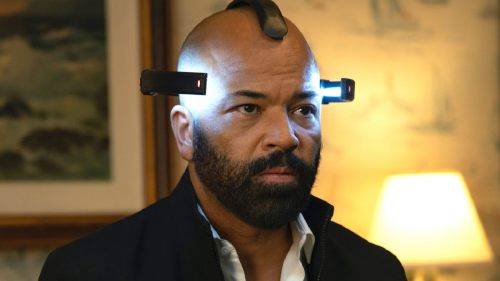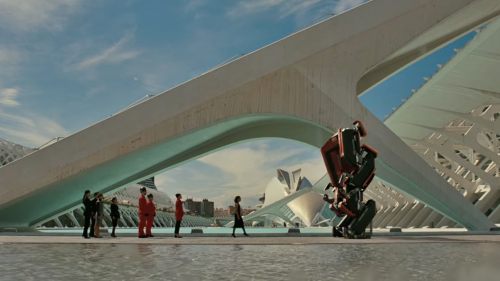WESTWORLD Review: 2.09 “Vanishing Point”
One of the biggest questions looming over Westworld’s second season - not a mystery per se, but a question - has been what the hell is up with William, aka the Man in Black. Given the amount of backstory granted to various characters throughout the season, William’s murky goals and motivations have been outliers. Up until this week’s episode, the aptly-titled “Vanishing Point,” we still didn’t really, truly know why he abandoned the real world in favour of his simulated evil-outlaw life. Who is this guy?
Before we discuss William, we’ve got other characters to deal with - and their stories took some intriguing turns this week, too.
Company woman Charlotte Hale’s plan for retaking the park is coming together - or so she believes. With Maeve incapacitated on a laboratory table, Hale's had her mind-control code extracted and placed into other, more compliant hosts - theoretically giving her a way to force any rebel hosts to kill each other. But that’s not what Robert Ford wants to happen. Appearing to Maeve as a digital message, Ford tells her of his distaste for human beings; how he put his cynicism into the hosts; that not only was Maeve his favourite creation, he wants her to escape the place she’s in. She’s in stasis, basically, but acting as a kind of Patrick character, orchestrating the park’s downfall with her very mind. Fingers crossed she escapes, or at least goes out in a blaze of glory.
Ford’s also in Bernard’s head, still, and his controlling influence is key to Bernard’s arc this episode. Unfortunately, Ford’s motivations for turning Bernard against Elsie - and indeed, his apparent desire to see the hosts become a wholly new species* - are as opaque as he is ethereal, rendering him kind of a two-dimensional villain at this point. He’s right about human nature, certainly - I share his cynicism - but the way he’s presented here leads me to side with Bernard as he screams “get out of my fucking head.” Handily, of course, Bernard has some skill when it comes to host engineering: taking matters into his own hands, he edits his code, removing Ford line by line - or so it seems, at least. Abandoning Elsie, he drives off to the Forge - the secret facility where guests’ cognition is being duplicated - to do whatever he’s gotta do.
Also heading to the Forge: Dolores, though thanks to this week’s episode, she’s now suddenly and hopelessly alone in her mission. An encounter with the Ghost Nation leaves her cultist goons dead, as well as many of the Ghost tribespeople. But it’s Teddy, her faithful lover and servant, whose departure from the story (at least for now) hits the hardest. Teddy’s transformation from softie to monster to self-aware monster has been underdramatised, but its culmination here is well-realised - and puts Dolores in an interesting place. She’s now an unhinged cult leader whose cult has either been killed or abandoned her - she’s got nothing to lose. Evan Rachel Wood’s performance upon Teddy’s death is fascinating, at once cold and emotionally engaged. Does Dolores come to terms with her actions here? Is she even capable of doing so?
Despite these developments, the bulk of “Vanishing Point” deals with William, his daughter Emily, his deceased wife Juliet, and the complicated history the three of them share. Through a combination of internal flashback and interrogation from Emily, we see and hear multiple perspectives on the turning point in all their lives: Juliet’s suicide. Driven to alcoholism by William's constant disappearances into the park, Juliet's misery is catching. But it’s William’s confession that the darkness within him is his true self that pushes her over the edge - that and her discovery of what he actually got up to inside Westworld. It’s quite the secret to discover: your husband isn’t just secretly a monster - he embraces that side of himself over the side that married you. This is among the sadder tragedies Westworld has told, and at this point, it’s told a few.
This all informs the action in the present, which sees William finally losing all touch with his reality. Even as Emily confronts him with his past actions, he’s unable or unwilling to believe it isn’t all a game designed solely for him. Emily’s desire for harsh justice against her father - it can barely even be described as revenge - is one of the purest motivations in the show, and as such, I guess she had to die. Believing her to be a host, William guns her down, along with a group of QA agents - and the realisation of what he did pushes him to the edge. Fully submerged in his existential crisis, he rides out into a field, contemplates and rejects suicide, then starts cutting and digging into his own body, suddenly believing himself to be a host. At this point, William is circling a psychological drain whether he’s a human or a mentally degrading duplicate. His grip on reality has slackened so much he’s even questioning himself - an inevitable endpoint to his obsession with “the game.”
"Fuck you, Ford," indeed.
Is William a replicant, based exclusively on his activities in the park? We’ll likely get some closure on that in next week’s season finale. We’ll see a major showdown take place at the Forge, and we’ll probably also see just how deep that particular rabbit hole goes (Matrix reference fully intended). Dolores wants to use it. Bernard wants to erase it. Akechete wants to access a new world through it. William wants to blow it up (along with the whole island). All our major characters - Bernard, Dolores, Maeve, William - are on their own, now. Exciting and probably depressing times ahead.
* Are they a species, though? Really?



